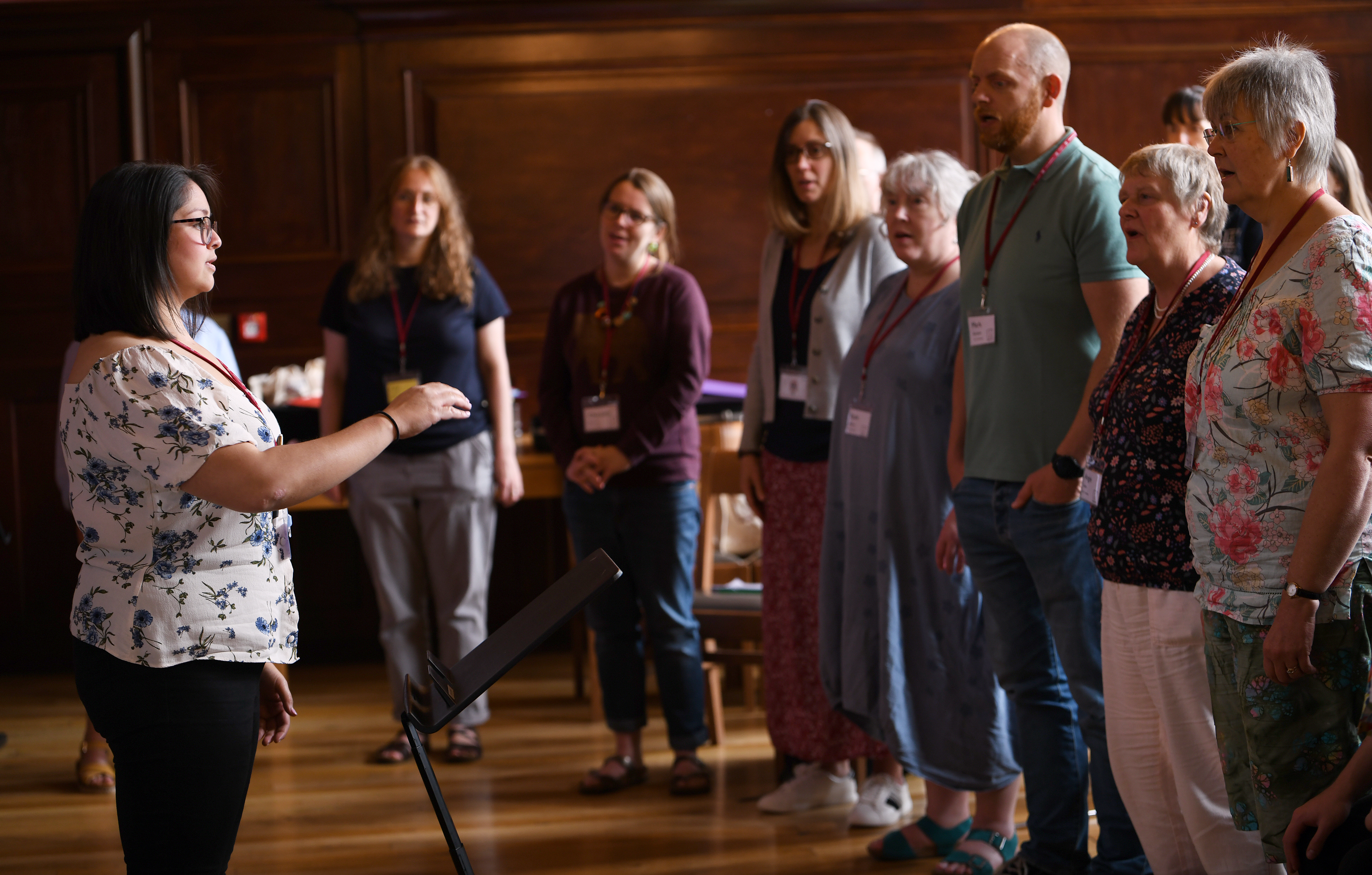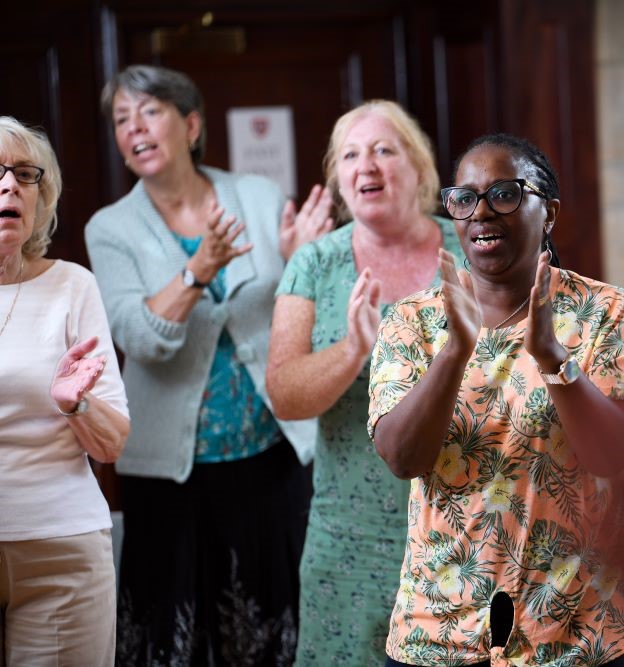
For 60 years the charity Sing for Pleasure has been fostering singing in schools and choirs, providing training for vocal leaders from all walks. By most accounts, the largely volunteer-run organisation is now the largest provider of choral conductor training in the UK.
Since 2023 SfP has been led by CEO Paul Cutts. It has a new mission statement, is busy brokering new partnerships with music education hubs, and has new core funding from The Foyle Foundation – at a time when many choral organisations are stuggling on the back of a pandemic, music's de-prioritisation in schools and competition, among the young, in the form of creativity using music tech, for example.
SfP runs three weekend courses during the year (in Manchester, Birmingham and London), and a well-established annual summer school (at Keele University) for conductors, vocal leaders and singers. The weekends include conducting courses organised at Foundation, Intermediate 1, Intermediate 2 and Advanced levels, serving beginners, students, teachers and specialist practitioners.
Teaching teachers
I caught up with SfP's head of programme and summer school course director, Ula Weber, to learn about its offer for teachers. Their provision includes resources and publications, the Vocal Leadership Training Programme (VLTP), other courses in conducting, and workshop events held in individual schools. SfP also offers bursaries to help with the cost of training courses.
Launched in 2015, the VLTP has helped numerous music education hubs. A five-day course involving training sessions spread over a period of months during one year, it allows attendees to learn bespoke repertoire and practise this at their schools in between meetings. The philosophy sounds comfortingly straightforward.
‘It's all about choral singing, regardless of the setting or type of choir’, explains Weber, ‘and how the skill-set remains the same’. Further, ‘It's how you develop this and use it with the people you're standing in front of; it's very much about the singers and how best to convey your meaning and teach them efficiently’.

According to the publicity, the VLTP welcomes vocal leaders ‘with a small amount of experience’. This poses the question, ‘How small is small?’, I suggest, particularly if taking into account current challenges around teacher recruitment and retention.
Weber explains: ‘We have had teachers who can't read music, or beginner teachers who may not have taught music or sung in a choir. There might, for example, be a second-cousin-twice-removed who once played the clarinet, and that person has become the school music coordinator.’
Weber speaks with some authority on such things, having been a primary school teacher herself and involved with SfP for 24 years.
‘The programme came into being for this purpose’, she continues. ‘It means that tutors like myself, who were school teachers, can teach complete beginners and say: “When I did this song with my Year 3 Class, this is how I managed it.”’ This supplements Weber's and her SfP colleagues' obvious expertise in singing and conducting choirs of all types.
At the same time, Weber recognises how having a music degree doesn't necessarily prepare you for the primary school classroom, or provide confidence. ‘Even teachers who read music can lack confidence standing in front of a whole-school assembly, leading the singing’. And then, we agreed, there's the matter of how most music teachers are instrumentalists, not singers. ‘There's nowhere to hide with singing, no instrument to hide behind’, she says – which is why new skills are necessary.
In Weber's experience, SfP courses thrive on flexibility and meeting individual needs. On the VLTP, ‘We have a set amount of podium time per attendee. If they've got six minutes in the first workshop of the day, they will make as much progress as they can make. This doesn't interfere with the pace of the rest of the course. Every attendee is on their own personal journey, whether that's being able to teach a whole song then a round, or just a melody. Both are absolutely fine’.
Best practice
On completing the VLTP, attendees receive certification as a ‘Sing for Pleasure Singing Leader’. It's not a certificate of accreditation in the formal sense, but SfP does align the course with DoE standards.
What key do's and don'ts, I ask, can participants expect to learn from the course. ‘I was a mover and a groover’, explains Weber, ‘and was told to stand still and use the upper half of my body rather than legs’, citing one example. ‘This was incredibly difficult for me to do, but it was a revelation: it transformed the way that I now lead singing.’
‘Not singing along [when leading] is another tricky thing for some’, she continues; ‘but attendees realise that they can't hear, listen, respond or react if singing along when this is pointed out’.
Other basic skills covered are pitch-patterning, learning hand independence, knowing how to protect children's voices, and recognising the differences between head voice and chest voice.
For teachers, motivation may also be personal, deep-rooted, suggests Weber. ‘I do wonder whether teachers are thinking: “I need to do something for me, so that I can help my children in schools, whether or not someone's going to pay for it”. That was the case when I was a teacher: I just wanted to improve my skills for the benefit of my children.’
Junior Songbook
Underpinning SfP's courses for teachers is a resource that's been the staple of school singing since the 1980s. SfP's Junior Songbook series contains hundreds of songs carefully moderated to reflect good practice while introducing a range of styles and cross-curricular topics. The series forms the bedrock of SfP's publishing programme and is ‘very much based on the mainstream SfP methodology’, according to Weber – ‘it's our kind of foundation.’ A Junior Songbook Pack forms the course material for the VLTP.
Under the guardianship of Don Gillthorpe, SfP's head of publications, the Songbook series is being revised on a rolling basis to reflect current thought and changing tastes. New songs are being commissioned from composers used to working with SfP and who have inside knowledge.
Let the party commence!
In November, as part of its diamond jubilee celebrations, SfP is hosting a showcase of its work in Manchester. A ‘Schools Singing Day’ (Friday 22) at Stoller Hall will see teachers and pupils across the northwest combine to sing and learn, and premiere a newly commissioned piece by Suzzie Vango (herself an SfP tutor). Weber is expecting ‘a fantastic day’, complete with interactive workshops, individual school performances, livestreaming for those who can't attend, and a live band as accompaniment.
The event is followed by a day-long conference, ‘SFP 60’, which will explore every aspect of singing, from arts policy to the role of singing in schools and communities.
While thinking of the pressures on schools and arts organisations, and a cost-of-living crisis, I ask if SfP is feeling positive and relevant at 60.
‘You know, I think we are’, Weber responds. The next mainstream SfP course, at Bromsgrove, is a month away and, so far, 78 people have signed up; historically, the figure is 35–40. ‘We're positive because we're seeing so many people coming through our doors in what is a challenging environment, taking away skills and applying them in the classroom or where they work. It feels like we're turning a new leaf; like it's a catalyst rather than end result.’




